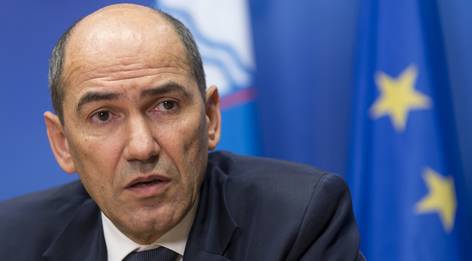NEWS
Prime Minister Janez Janša: a European summit of extreme importance
The meeting of the European Council and the euro area countries which, in the words of the Slovenian Prime Minister Janez Janša had "yielded better results than we could have hoped for" closed its doors today in Brussels. The Prime Minister considers that the statements, conclusions and long-term decisions made are of the utmost importance for Slovenia. The European heads of state and government adopted a series of short- and long-tem measures combining actions for solving crisis situations with renewed impetus for growth and jobs. In the Prime Minister's view, the achievements of the recent European Council meeting are the fruits of extensive and arduous coordination efforts; he was therefore optimistic about the reaction of the financial markets.
"The key document adopted by the European Council is the Compact for Growth and Jobs. This is a strategic document which addresses the challenges the European Union will face in the coming years," the Prime Minister explained in his statement to the press. He stressed the importance of the document for Slovenia, which has a mostly export-oriented economy, as it will create a better and more competitive economic environment within the European Union for the years ahead. "Moreover, the Compact includes certain measures regarding the creation of additional financial sources which will also be directly accessible to Slovenia, and will help mitigate the investment drought we are currently experiencing," the Prime Minister said, before adding that, through these measures, solutions have finally been found for certain unresolved issues such as the agreement on the Unitary Patent System. Through the adoption of the Unitary Patent System, Europe has made a significant step towards improved global competitiveness which will, in the long-term, have a positive impact on economic growth.
He also touched on the in-depth discussions held by the heads of state and government on the forthcoming Multiannual Financial Framework, where work will continue on the basis of orientations already drafted and commented upon by member states.
International political topics currently the focus of the world's attention that require resolution in the interests of global peace were also on the European Council's agenda. In this regard, the Prime Minister drew attention to the conflict in Syria, where the European Union is actively involved in the resolution of the crisis, working closely with key international partners.
Speaking of the use of the European Union's additional rescue mechanisms, the Prime Minister stated that "the Slovenian Government is taking all possible actions to exit from the actual situation without resorting to using the European Union's rescue mechanisms. We are firmly convinced that, owing to the measures that have been taken – particularly the adoption of the Fiscal Balance Act – Slovenia is currently outside the danger zone of needing to request assistance." In the Prime Minister's view, the only unknown in this equation remains the banking sector; however, it would be premature to make any assumptions as Slovenian banks are presently being thoroughly audited. "At this time, any speculation on Slovenia requiring such assistance is baseless," the Prime Minister confirmed.
In response to a reporter's question on the pension reductions, the Prime Minister explained that no provision in the Fiscal Balance Act provides for a reduction, even by a single euro, to any pension based on paid-in contributions. He stressed that "this Act did not reduce the amount of any pension based on paid contributions, but it did reduce certain allowances annexed to pensions which are not based on contributions but are instead paid from the budget," before adding that it "is necessary to separate the two elements".





